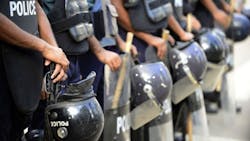Tear Gas Fired as Bangladesh Garment Workers Strike
DHAKA - Thousands of angry Bangladeshi workers who stitch clothes for leading Western brands downed tools and took to the streets Monday to demand higher wages, forcing 100 factories to close, police said.
Police said several hundred of the workers tried to attack factories and vehicles during the protests in the garment hub of Ashulia on the outskirts of Dhaka, forcing officers to fire tear gas in response.
The workers are demanding a steeper wage hike to $100 per month than the rise to $67 approved last week by the Minimum Wage Board after rounds of meetings with industry, unions and government representatives.
"There were an estimated 30,000 workers who came out of their factories and took to the streets," industrial police inspector Abdus Sattar said.
"Several hundred of them went unruly and tried to vandalize properties. So we dispersed them by firing tear gas," he said, adding that several protestors were injured.
Some 100 factories were forced to shut down during the protests, which come after a string of recent disasters that killed more than 1,000 people and have highlighted the garment industry's low pay and poor conditions.
"The workers were demonstrating for a 8,114 taka (US $100) minimum wage," said Badrul Alam, a police inspector in Ashulia.
"At least 100 factories were forced to suspend their production for the day fearing further violence," Alam said.
Wages are Lowest in the World
The board recommended raising the minimum monthly wage from 3,000 taka (US $38) to 5,300 taka (US $67), still the lowest in the world and well short of what some unions were demanding.
The Bangladesh Garment Manufacturers and Exporters Association, which represents 4,500 factories, has rejected the $67 figure as too high, and urged the government against implementing it.
Bangladesh is the world's second largest exporter of garments, with the industry employing some four million workers, producing clothes for retailers such as Wal-Mart and H&M.
The government pledged to raise wages by November, based on the board's recommendation, after strikes in September saw tens of thousands of workers take to the streets, torch factories and clash with police.
Protests over poor wages, benefits and working conditions are frequent in Bangladesh but have gained in intensity since the collapse of the Rana Plaza factory complex in April. A total of 1,135 people were killed in what was one of the world's worst industrial disasters.
Copyright Agence France-Presse, 2013
For complete coverage of the Bangladesh garment industry, check out EHS Today, IndustryWeek's sister publication.
About the Author
Agence France-Presse
Copyright Agence France-Presse, 2002-2025. AFP text, photos, graphics and logos shall not be reproduced, published, broadcast, rewritten for broadcast or publication or redistributed directly or indirectly in any medium. AFP shall not be held liable for any delays, inaccuracies, errors or omissions in any AFP content, or for any actions taken in consequence.
